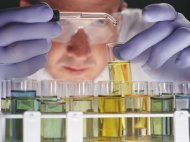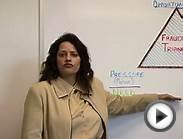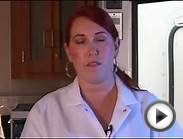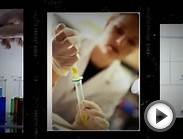 Forensic toxicologists identify chemical substances involved in deaths and crimes.
Forensic toxicologists identify chemical substances involved in deaths and crimes.
Ryan McVay/Photodisc/Getty Images
When news reports note that a murder or accident victim’s cause of death awaits test results, a forensic toxicologist is working behind the scenes. This forensic scientist tests tissue samples, stomach contents and body fluids to determine the presence of drugs, alcohol, poison and gases such as carbon monoxide. A forensic toxicologist applies chemistry, pharmacology and biology to give forensic pathologists, investigators and legal representatives crime-solving information based on scientific analysis.
Responsibilities
Forensic toxicologists prepare reports that identify toxins and their concentration in the body. The tests these scientists run determine the extent of any physical or mental impairment caused by drug and alcohol use or verify environmental contamination. Situations calling for their expertise include traffic accidents, to ascertain whether the driver was under the influence of a controlled substance; sports investigations, to determine an athlete’s use or non-use of performance-enhancing drugs; and business screenings, to clear workers of drug and alcohol use. On occasion, forensic toxicologists may provide court testimony related to their procedures and findings.
Personal Attributes and Skills
Forensic toxicologists need good motor skills and dexterity to test evidence. They have strong communication skills and are adept at using computers. Analytical by nature, forensic toxicologists revel in details and work well under pressure. Patience is an asset in this profession, as is respect for scientific protocol. A strong stomach and mental fortitude come in handy when facing the unpleasant conditions of crime scenes and working with body fluids. "Trustworthy" and "ethical" describe these professionals.
Related Reading: How Is a Forensic Entomologist Different from a Forensic Pathologist?
Education
A career as a forensic toxicologist requires a bachelor’s degree in biochemistry, chemistry, pharmacology or a related field from an American Academy of Forensic Science-accredited school. In addition to coursework in calculus, statistics and physical sciences, prospective forensic toxicologists in a four-year accredited degree program study evidence handling and courtroom testimony. A master’s degree allows for more specialization, while a doctorate lends more credibility and can accelerate career advancement. Regardless of the degree held, a forensic toxicologist must keep pace with new drugs, tests and instrumentation through continuing education.
Source: work.chron.com
You might also like:






















Forensics are scientific tests or techniques used in the investigation of crimes. Patho...